
Montalcino is a hill town and comune in the province of Siena, Tuscany, central Italy.

Grosseto is a comune in the central Italian region of Tuscany, the capital of the province of Grosseto and of the Maremma. The city lies 14 kilometres from the Tyrrhenian Sea, at the centre of an alluvial plain on the Ombrone river.
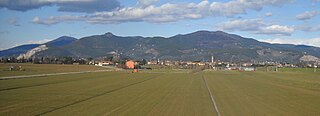
The province of Pisa is a province in the Tuscany region of Italy. Its capital is the city of Pisa. With an area of 2,448 square kilometres (945 sq mi) and a total population of 421,642, it is the second most populous and fifth largest province of Tuscany. It is subdivided into 37 comuni.

Iglesias is a comune and city in the province of South Sardinia, Italy. It was co-capital of the province of Carbonia-Iglesias with Carbonia, and the province's second-largest community.

Empoli is a town and comune in the Metropolitan City of Florence, Tuscany, Italy, about 30 km southwest of Florence, to the south of the Arno in a plain formed by the river. The plain has been usable for agriculture since Roman times. The commune's territory becomes hilly as it departs from the river. Empoli is on the main railway line from Florence to Pisa, and is the point of divergence of a line to Siena. Empoli has an enduring tradition as an agricultural centre. It has given its name to a local variety of artichoke.

San Miniato is a town and comune in the province of Pisa, in the region of Tuscany, Italy.
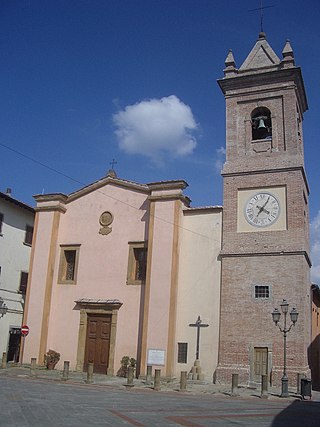
Montaione is a comune (municipality) in the Metropolitan City of Florence in the Italian region Tuscany, located about 35 kilometres (22 mi) southwest of Florence. It is one of I Borghi più belli d'Italia.
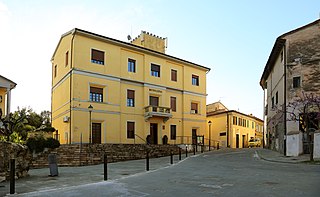
Crespina is a frazione (hamlet) in the comune of Crespina Lorenzana, in the Province of Pisa in the Italian region Tuscany. It is located about 60 kilometres (37 mi) southwest of Florence and about 20 kilometres (12 mi) southeast of Pisa.

Fauglia is a comune (municipality) in the Province of Pisa in the Italian region Tuscany, located about 60 kilometres (37 mi) southwest of Florence and about 20 kilometres (12 mi) southeast of Pisa. As of 31 December 2004, it had a population of 3,298 and an area of 42.4 square kilometres (16.4 sq mi).
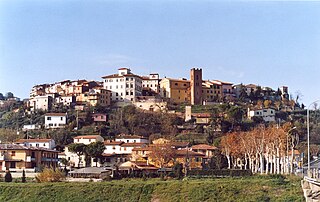
Santa Maria a Monte is a comune in the Province of Pisa in the Italian region of Tuscany. The town lies about 45 kilometres west of Florence and about 25 kilometres (16 mi) east of Pisa.

Vicopisano is a comune (municipality) in the Province of Pisa in the Italian region Tuscany, located about 50 kilometres (31 mi) west of Florence and about 15 kilometres (9 mi) east of Pisa. It occupies the former valley of the Arno River, bounded by the Monte Pisano from north.

Talamone is a town in Tuscany, on the west coast of central Italy, administratively a frazione of the comune of Orbetello, province of Grosseto, in the Tuscan Maremma.

Montevitozzo is a village in Tuscany, central Italy, administratively a frazione of the comune of Sorano, province of Grosseto, in the tuff area of southern Maremma. At the time of the 2001 census its population amounted to 106.

Monticello Amiata is a village in Tuscany, central Italy, administratively a frazione of the comune of Cinigiano, province of Grosseto. At the time of the 2001 census its population amounted to 425.

Porrona is a village in Tuscany, central Italy, administratively a frazione of the comune of Cinigiano, province of Grosseto. At the time of the 2001 census its population amounted to 24.
Casciana Terme Lari is a comune (municipality) in the Province of Pisa in the Italian region Tuscany, located about 60 kilometres (37 mi) southwest of Florence and about 30 kilometres (19 mi) southeast of Pisa.
The following is a timeline of the history of the city of Pisa in the Tuscany region of Italy.

Gello is a village in Tuscany, central Italy, administratively a frazione of the comune of Palaia, province of Pisa.
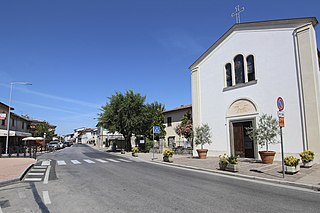
Cenaia is a village in Tuscany, central Italy, administratively a frazione of the comune of Crespina Lorenzana, province of Pisa. At the time of the 2001 census its population was 1,700.
Laura is a village in Tuscany, central Italy, administratively a frazione of the comune of Crespina Lorenzana, province of Pisa.




















